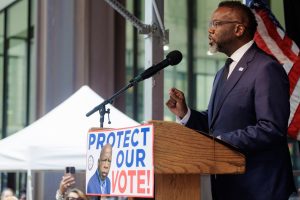City invests to fight homelessness
Chronicle Media — July 25, 2025
Chicago Mayor Brandon Johnson announced that the city is allocating $40 million in grants to modernize seven homeless shelters. “This investment is the most significant step forward in the history of Chicago in our mission to make housing a human right in our city,” Johnson said.
Chicago is allocating $40 million in grants to modernize seven homeless shelters.
The funds aim to provide capital improvements to create healthier, safer, less congregate and more accessible facilities that will serve families with children, unaccompanied youth, adult single women and men, and returning citizens.
The funding is part of the Chicago Department of Family and Support Services’ Shelter Infrastructure Initiative, the largest local shelter capital investment in Chicago’s history, according to city officials. It builds on $30 million in related investments by the Department of Housing, and reflects a citywide commitment to creating non-congregate, accessible, dignified, and trauma-informed shelter environments for people experiencing homelessness, they said.
“This investment is the most significant step forward in the history of Chicago in our mission to make housing a human right in our city,” said Mayor Brandon Johnson. “When it comes to building a safe and affordable city, housing and shelter must be prioritized to stabilize our residents who are housing insecure or experiencing homelessness.
“With this historic investment, we are making our shelters more accessible, more dignified, and ultimately, more effective at helping Chicagoans in need.”
The funding will support improvements to more than 750 permanent shelter beds in Chicago, increasing Americans with Disabilities Act accessibility, modernizing aging infrastructure and other systems, and developing more than 350 non-congregate beds so individuals and families have a private sleeping room and bathroom with secure storage space for their belongings. Research shows non-congregate shelters in Chicago and elsewhere improve health and housing outcomes for residents compared with congregate shelter settings.
“It is a proud day for the city of Chicago as we reinforce our commitment to serving our city’s most vulnerable and doing all we can to ensure all individuals and families are able to access the support and care they need,” said DFSS Acting Commissioner Maura McCauley. “This investment is a significant step toward meeting the broad range of unique circumstances and experiences faced by those entering the shelter system and doing so with utmost compassion, dignity, and intentionality.”
The Shelter Infrastructure Initiative is backed by $20 million in federal HOME Investment Partnerships American Rescue Plan funds and $20 million in locally issued bond funds, and builds upon two years of project readiness assessments, site planning, and environmental reviews to achieve system-wide improvements. DFSS is partnering with the Illinois Facilities Fund as the program administrator for the initiative.
“The Shelter Infrastructure Initiative is a powerful example of how Mayor Johnson’s administration is investing in solutions that honor the lives of our unhoused neighbors,” said Sendy Soto, chief homelessness officer for the city. “With renewed funding and a focus on best practices, we’re building a city where everyone has the support they need, no matter where they are on their housing journey.”
Beyond the funding opportunity for improvements to existing shelter facilities, DFSS is also working in partnership with the Department of Housing to implement its Non-Congregate Shelter Acquisition Program. DOH has allocated $30 million in bond funding to acquire and rehabilitate non-congregate shelter facilities. The program is transitioning more than 300 congregate shelter beds operated by five selected shelters into non-congregate, prioritizing those shelters in greatest need of improved conditions.
The capital improvements span seven neighborhoods across the North, South, and West sides, and serve a range of populations, including families with children, unaccompanied youth, adult single women and men, and returning citizens.
Shelters received provisional grant awards through a Request for Proposals process are:
– St. Leonard’s Ministries – St. Leonard’s House (Near West Side)
– St. Leonard’s Ministries – Grace House (Near West Side)
– Franciscan Outreach – House of Mary and Joseph (East Garfield Park)
– The Inner Voice – Pioneer House (West Garfield Park)
– Covenant House Illinois (East Garfield Park)
– Cornerstone Community Outreach – Sylvia Center (Uptown)
– Olive Branch Mission – Lamplight (West Englewood)
Each of the funded projects aligns with national best practices, offering improved privacy, safety, accessibility and supportive services. The majority of projects will undergo Americans with Disabilities Act upgrades, fire and life-safety improvements, and energy-efficiency enhancements. Most projects are leveraging public and philanthropic funding, including tax increment financing support and federal earmarks, to achieve capital improvement goals.
For information about the Shelter Infrastructure Initiative or to access shelter services, residents can visit www.chicago.gov/dfss or email dfss@cityofchicago.org.







